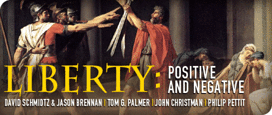Let me be somewhat narcissistic and respond to Tom Palmer’s comments on my own position, without giving attention to the many other interesting points raised in this discussion.
Palmer chides me for ignoring the possibility of liberal republicanism, which he associates with Joyce Appleby’s historical study. I am not exactly sure what he has in mind with this tag but his remarks suggest that I would be happy to embrace it. He says that in this tradition “freedom from subjection to the arbitrary will of others is identified with freedom.” While I might quibble about the employment of the word ‘freedom’ within a definition of freedom, and while I would want to say something more on the definition of ‘arbitrary’, I am happy to endorse this account. The definition is faithful to the classical republican account of freedom, as I understand it, and it is freedom in that sense that I would want to cast as the central value in political life. Republicanism may be sharply opposed to the sort of position endorsed by those influenced by William Paley and his ilk — classical liberals, as they are sometimes called — but it is in contemporary terms a broadly liberal style of doctrine.
Palmer casts my republicanism as illiberal because he pays scant attention to what I have written. He misreads my 1997 book in his suggestion that by my lights I suffer only non-arbitrary interference when the interference “furthers my interests.” He misrepresents me on a grand scale in the remark that interests are to be understood here as “real interests” or the interests of “some occult true self.” And he gives the misrepresentation a truly operatic character when he groups me with “Genevan republicans” and declares about me and my new-found ilk: “they have their own ideas about what’s good for you, and you’re going to get it good and hard.” Wow.
In my 1997 book I explicitly said that what makes interference with others non-arbitrary is that it is “forced to track what the interests of those others require according to their own judgments” (p. 55). Could I have been clearer? There is no question of the interference being non-arbitrary just because it tracks people’s “real” but unacknowledged interests; and no question of my tolerating Rousseauvian paternalism of the kind that Palmer rightly mocks. And so neither, to address the main charge against me, is there is any room for claiming that republican theory, in the way I interpret it, defends a variant of Berlin’s positive freedom. For the record, my writings since the 1997 book have stressed even more clearly the hostility of the position to Rousseauvian paternalism. Thus I have written of non-arbitrary interference that it must be forced to track the avowed or ready-to-be-avowed interests of the interferee and, in yet another formulation, that it must be subject to the control of the interferee.
In a related charge Palmer says that according to me “the interferee’s consent is irrelevant” to whether interference is non-arbitrary. Again, this is highly misleading. I think that if you are in a position to control some source of interference in your life, then it is non-arbitrary on that count alone. Thus, while it is true that you need not have consented to the interference in the first place, that is only because the continuing possibility of stopping the interference means that your acceptance of it consensual. Here as in so many other cases, what is important is that you can exit the arrangement, not that you gave your consent to enter it in the first place.
Let me make a concession, however. In these remarks I am focusing on the freedom of a single subject, or of a set of subjects considered singly, in relation to an interfering agent or agency. And that is the easy case for republican theory. The problematic case, which I do not discuss satisfactorily in my 1997 book, arises in the political case, when people are subject in common to the interference of a government. Their collective control of government interference, even if they have this, won’t give any individual the sort of control that would make that interference non-arbitrary. So what is there to be said? Lots, as I happen to believe, but too much to include in this posting. Some of Palmer’s comments bear on the problematic case and so my response here will not satisfy him fully.
One final observation. I associate the long republican tradition with three broad ideas: one, a commitment to freedom as non-domination; two, a belief that the mixed constitution is the form that government ought to take if it is to protect people against domination and yet not dominate them itself; and three, a belief that if such a constitution is to be sustained then people must adopt an active, contestatory role in relation to government: apart from collective, electoral contestation, they must remain individually vigilant and, if necessary, adversarial. Under the influence of Bodin and Hobbes and the champions of undivided sovereignty, Rousseau dropped the mixed constitution in favor of a centralized, assembly government and gave citizens a legislative rather than a contestatory role. In doing this he paved the way for a new Franco-Prussian form of republicanism that was very different from the Italian-Atlantic republicanism that I find attractive. Within this new tradition even the ideal of freedom as non-domination, still embraced by Rousseau, morphed into an ideal under which freedom consists in participatory access to the legislative body of a self-governing community: that is, morphed into one form of what Berlin calls positive liberty. It may be that Tom Palmer is mistaking the sort of republican theory I embrace for this very different, essentially communitarian way of thinking.

